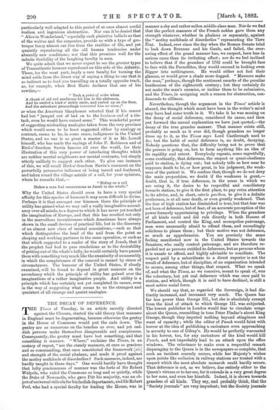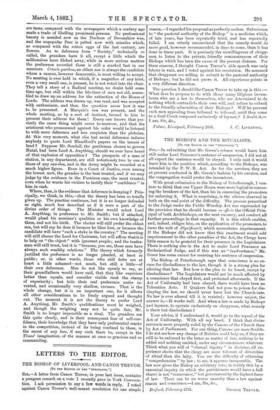THE DECAY OF DEFERENCE.
THE Times of Tuesday, in an article secretly directed against the Closure, started the odd theory that manners in England must be degenerating, because otherwise the gentry in the House of Commons would put the cads down. The gentry are as numerous on the benches as ever, and yet cad- dish persons make themselves disagreeable and conspicuous. Consequently, the gentry must have lost something, and that something is manner. " Where," exclaims the Times, in an ecstasy of regret, "are the stately manners, at once so gracious and so commanding, that once constituted the framework [sic] and strength of the social phalanx, and made it proof against the motley multitude of disorderlies P Such manners, indeed, are hardly taught in these days." One would hardly have thought that lofty graciousness of manner was the forte of Sir Robert Walpole, who ruled the Commons so long and so quietly, while the Duke of Newcastle, who gave Pitt his majority, was an ob- ject of universal ridicule for his foolish deportment; and Sir Robert Peel, who had a special faculty for leading the House, was in
manner a shy and rather sullen middle-class man. Nor do we find that the perfect manners of the French nobles gave them any strength whatever, whether in phalanx or separately, against the " motley multitude of disorderlies " representing the Tiers ttat. Indeed, ever since the day when the Roman Senate tried to look down Brennus and his Gauls, and failed, the over- awing effect of the grand manner has, we suspect, been less in serious cases than its irritating effect ; nor do we feel inclined to believe that if the grandees of 1782 could be brought face to face with the Parnellites, they would succeed in looking even Biggar into nothingness. He would either not feel their glances, or would grow a shade more dogged. " Manners make the man," perhaps, though the sentiment smacks of the peculiar
heathenism of the eighteenth century; but they certainly do not make the man's enemies, or incline them to be submissive, and the Times, in assigning such a reason for obstruction, con- descends to silliness.
Nevertheless, though the argument in the Times' article is absurd, the thought which must have been in the writer's mind
may have had some truth in it. We take it he was musing on the decay of social deference, considered its cause, and then put forward the unreal explanation we have just quoted,—the decay of the true grandee manner. That manner exists still,
probably as much as it ever did, though grandees no longer dress up to it, as the Times says Lord Castlereagh used to
do; but the habit of social deference is, no doubt, decaying.
Nobody questions that, the difficulty being not to prove that the process is going on, but to form anything like an idea of its rapidity and extent. Everybody repeats, some regretfully, some exultantly, that deference, the respect or quasi-obedience paid to station, is dying out; but nobody tells us how near he supposes death to be, or how great, in his judgment, the weak-
ness of the patient is. We confess that, though we do not deny the main proposition, we doubt if the weakness is great,—
doubt, that is, if true deference, in the sense in which we are using it, the desire to be respectful and conciliatory towards station, to give it the first place, to pay extra attention
to its advice, and, in short, ceteris paribus, to give it a definite
preference, is at all near death, or even greatly weakened. That the fear of high station has diminished is true, but that fear was not born of deference, but of fear, of an accurate perception of the power formerly appertaining to privilege. When the grandees of all kinds could and did rule directly in both Houses of Parliament, and control the King, and monopolise patronage, men were necessarily afraid to offend them, and exceedingly solicitous to please them ; but their motive was not deference, so much as apprehension. You see precisely the same feeling manifested now in the United States towards the Senators, who really control patronage, and are therefore re- garded not as persons entitled to deference, but as persons whom it is unsafe to offend, and highly advisable to conciliate. The respect paid by a subordinate to a direct superior is not the result of deference, but of discipline, of an organisation intended
to secure, among other things, that respect. What we speak of, and what the Times, as we conceive, meant to speak of, was
the voluntary, but yet real deference which was once paid to station, and which, though it is said to have declined, is still a most active social force.
We should say that, as regarded the Sovereign, it had dis- tinctly increased, and increased very much. The Queen has
far less power than George III., but she is absolutely exempt from the kind of attack to which George III. was subjected. The lowest publisher in London would fear to circulate songs
about the Queen, resembling in tone Peter Pindar's about King George, though they imputed nothing beyond stinginess and
want of capacity ; while the editor of Punch would faint with
horror at the idea of publishing a caricature even approaching in severity to one of Gilray's. He would be perfectly warranted in his horror, too, for any caricature of the kind would kill
Punch, and not improbably lead to an attack upon the office windows. The reluctance to make even a respectful remark
disparaging to the Queen is in the newspapers so complete, that such an incident scarcely occurs, while her Majesty's wishes upon points like seclusion in railway stations are treated with a respect which the most absolute monarch could hardly secure.
That deference is not, as we believe, due entirely either to the Queen's virtues or to her sex, for it extends in a very great degree
to her sons, and even her kinsfolk. Indeed, it is shown towards grandees of all kinds. They say, and probably think, that the "Society journals" are very impudent; but the Society journals are tame, compared with the newspapers which a century ago made a trade of libelling prominent persons. No professional beauty is assailed now as the Duchess of Devonshire was, and the unpopular Peer is pelted now with missiles which, as compared with the rotten eggs of the last century, are flowers. As to deference from " Society," technically so called, the grandees have it all, except a little which the millionaires have filched away, while in more serious matters the preference accorded them is still a marked fact in our manners. Ceteris paribus, an eldest son is always the candidate whom a caucus, however democratic, is most willing to accept. No meeting is ever held in which, if a magnifico of any kind, even a very small one, is present, he is not voted into the chair. They tell a story of a Radical meeting, no doubt held some time ago, but still within the life-time of men not old, assem- bled to draw up an address for the extinction of the House of Lords. The address was drawn up, was read, and was accepted with enthusiasm, and then the question arose how it was to be presented. A Marquis's son was present, and the whole meeting, as by a sort of instinct, turned to him to present their address for them ! Every one knows that pre- cisely the same thing might occur to-morrow, and that the aristocrat who pronounced against his order would be listened to with more deference and less suspicion than the plebeian. At this very moment, what else but social deference induces anybody to quote Lord Blandford's papers on the tenure of land. P Suppose Mr. Sendall, the gentleman chosen to govern Natal, had been Lord A. Anything, should we ever have heard
of that explosion of opposition P The prospects of a man of station, in any department, are still notoriously two to one of those of any one else, and in the Army might be recorded at a much higher figure. Even in a Court of Justice, even among the lowest mob, the grandee is the best treated, and if we may judge by the evidence in the Furnieux case, the most trusted, even when he wants his victims to testify their " confidence " in him in cash.
Where, then, is the evidence that deference is decaying P Prin- cipally, we think, in this,—that the theory has been so totally given up. The practice continues, but it is no longer defended as right, much less described as if it were a part of the divine order of things. The Minister would select Lord A. Anything, in preference to Mr. Smith; but if attacked, would plead his nominee's qualities or his own knowledge of them, and not his birth. The elector will still prefer the eldest son, but will say he does it because he likes him, or because the candidate will have "such a stake in the country." The meeting will still choose the Lord for Chairman, but will affirm thatit is to help on "the object" with ignorant people; and the trades- man will still trust, but it is "because, you see, those men have always such wealthy relations." The theory which formerly justified the preference is no longer pleaded, at least in public; or, in other words, those who still defer are at heart a little ashamed—not much, but still a little—of their own deference. Men do not like openly to say, as their grandfathers would have said, that they like superiors better than equals, and consider visible rank the stamp of superiority ; but hide their real preference under in- vented, and occasionally very shallow, excuses. That is the whole change, but it is an important one, for it allows all other considerations to be freely argued and thought out. The moment it is not the theory to prefer Lord A. Anything, Mr. Smith's qualifications must be weighed, and though the weighing may not be quite fair, Mr. Smith is no longer impossible as a rival. The grandees see this quite clearly, and in their consequent loss of self-con- fidence, their knowledge that they have only preferential marks in the competition, instead of its being confined to them, is the secret of any loss, if any such there be, except in the Times' imagination, of the manner at once so gracious and so commanding.



































 Previous page
Previous page